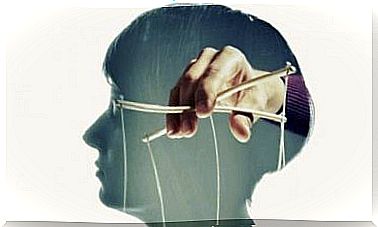The Invitation Technique: Dealing With The Opinions Of Others

Psychology always tries to make the patient stronger. The intention is that he takes the reins of his own life into his own hands. He learns how to avoid emotions or external situations taking over all control. The idea is to encourage unconditional acceptance: of oneself, others and life in general. That way, everything that happens will affect us to the right degree: no more, no less. In this article we want to talk about how we allow ourselves to be insulted and how you can learn to prevent this with the invitation technique.
You may think this is about adapting, conforming. But that is not it. As the word suggests, adapting means shackling ourselves in our comfort zone. We settle into what we can control. But it teaches us not to accept. We are still afraid to spread our wings and discover the magic that life has in store for us.
We don’t want conformists. We love passionate people who jump headfirst into life. They are people with goals, desires and dreams that they want to fulfill. These people are emotionally mature. They control their emotions and control the way they interpret and perceive the world. They are able to accept defeat, failure and criticism as a normal part of life.
How many times have we gotten angry because someone said something mean to us or treated us unfairly? How many times have we blamed others for our feelings? We have all made this mistake. But our feelings are only ours. When we don’t feel good emotionally, it’s because we’ve decided to feel that way.
You let yourself be offended, not the others
It is true that no one likes to have one of their flaws in the spotlight or to be reminded of a mistake. In general, no one likes criticism. People prefer flattering words and praise. Because that gives us the feeling of being accepted. Approval makes us feel very good. Because it actually stimulates the reward system in our brains. That happens to the extent that we can become addicted to approval. Criticism and rejection can make us feel anxious, depressed, or angry.
Obviously, we don’t want to feel those emotions. Rather, we want to avoid them at all costs. But the problem is, the way we choose to avoid them is usually not the best.

When we hear a negative comment about ourselves, usually the first thing we do is get on the defensive. We try to justify ourselves. We make statements or turn the criticism against the person giving it.
Why are we doing this? The reason is that we feel insulted. The reason is not what they said. But we believe that what this person has said about us is the truth. We can deny his criticism but deep down we confirm it.
Suppose we accept the criticism of others. We believe them. Then we internalize this criticism and integrate it into our view of the world as truths. This is how we allow them to change the way we think. That decision means we behave like puppets controlled by the opinions of others.
So it’s not the others who offend us. The people around us have the right to express their opinion. On the contrary, we ourselves are actually responsible, because we cling to those opinions and believe them.
Don’t you find it interesting that this doesn’t happen so often with praise? Most of the time, we don’t take compliments in the same way we take criticism. But if someone tells us something negative, we immediately adopt it.
The invitation technique: do you accept the invitation?
In therapy, the invitation technique is used to show the patient what we have explained above. Buddha said, “If someone gives you a gift and you refuse it, who does it belong to?” Of course, it still belongs to the person who wants to give us the gift. Well, the same thing happens with criticism.
Insults, criticism and toxic comments are like gifts. If you accept it, you accept it. If you don’t accept it, whoever insults you will be left with it.

If people decide to waste their energy on us by being negative, that’s their problem. We don’t have to accept their insults. So if we do, then it’s our problem. Because there is no point in trying to change the other person’s opinion. Chances are it’s a waste of energy.
With the invitation technique, the therapist invites the patient to feel a certain way. For example, the patient can apply this technique in case of failure, a toxic person or a negative interaction. Psychologists use this technique with patients who come to their office with these kinds of complaints or when others have made them unhappy.
The invitation technique, step by step
- As an invitation, the therapist gives you a card on which is written the following sentence: “I or you (mother, spouse, coworker, etc.) invite you to feel (useless, ugly, fat, etc.). Do you accept the invitation?’
- The next step in the invitation technique is for the patient to write that he does not accept that he feels this way. Because he doesn’t think this describes him. But he does understand that it is the other person’s point of view.
- In this way the patient learns to accept himself unconditionally. At the same time, he accepts the opinions of others and does not try to change them. Most importantly, he learns not to be offended by assuming beliefs that are not his.
This acceptance frees us from the burden of trying to please everyone. Because it’s something we should never do. We must mentally apply the invitation technique as much as is necessary. That is, whenever we meet someone who judges us in a negative way. With this technique we will be less and less offended. We will even learn how to use criticism to our advantage.









